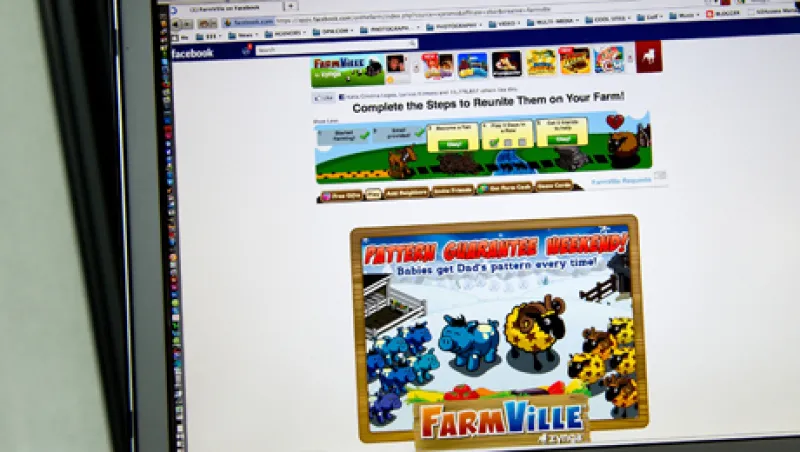Could the market hype swirling around social media darlings like Zynga be losing its steam?
The largest maker of games for Facebook was expected to go public this week with a valuation of as much as $20 billion. Instead, the company raised $1 billion.
Zynga is the largest and best known of the start-ups in the Facebook ecosystem, with popular games like “Mafia Wars,” “CityVille,” and “FarmVille.” There are dozens more game makers, some with valuations of hundreds of millions of dollars.
Whether the social media revolution is playing itself out remains to be seen. Despite Zynga’s lower-than-expected IPO yesterday, the company still receives a lot of luster from its association with Facebook. Indeed, an invitation to “log on with Facebook” indicates that for many of the social network’s 800 million users, a Facebook log-on is now tantamount to online identify itself, a passport to countless other sites that are eager to integrate themselves into Facebook’s ecosystem, orbiting like planets around a life-giving sun.
Facebook has joined the ranks of the great technology companies—such as Apple, Google, IBM Corp. and Microsoft Corp.—that are imposing new rules and business models on existing markets and sparking the creation of new markets and businesses that bear their stamp. It’s that power, even more than Facebook’s size, that accounts for the company’s stunning $70 billion private market valuation and the soaring value of the companies that are following in its wake.
“The excitement over Facebook reflects more than just its number of users or its revenue. The valuation reflects Facebook’s power as an Internet platform. That is what investors pay for,” says J.T. Treadwell, the veteran Silicon Valley venture capitalist and private equity investor who led Symphony Technology Group’s June acquisition of online price-comparison service Shopzilla.
And they pay a lot. Consider the valuation of Airbnb, an online market that allows people to treat their homes like hotels, renting out rooms to strangers. In July venture capital firm Andreessen Horowitz led a $112 million B-round investment that reportedly valued the three-year-old company at $1.3 billion. Other investors include Jeff Bezos, Ashton Kutcher and Digital Sky Technologies, a Russian venture capital firm with a large stake in Facebook. Airbnb is said to be on track to generate $25 million in revenue this year. Its $1.3 billion valuation is 52 times revenue, compared with ratios of about 17-to-1 for Facebook and less than 6-to-1 for Google. Airbnb ranked 16 on business news site Silicon Alley Insider’s October 7 list of the 100 most valuable start-ups.
How can Andreessen Horowitz justify those numbers? Part of the reason is that Airbnb is tightly integrated with Facebook. Users can log in with their Facebook IDs and share Airbnb comments via the Facebook platform. Imagine what a challenge it is to persuade people to rent rooms in strangers’ homes in distant cities. In such cases the recommendations of friends and peers can build the confidence necessary to making the market work. “Facebook has been a great source of new users for Airbnb. It has also helped to improve the transparency of user identities, increasing trust and safety in our community. It is a very important channel for us,” says Silicon Valley veteran Jeff Jordan, a founding eBay employee and current partner at Andreessen Horowitz, which was launched by Netscape Communications co-founder Marc Andreessen. “I think the opportunity is huge. Airbnb can be as big a company as Ebay is. It can do for lodging what Ebay did for auctions of goods,” Jordan adds.
Social influence is a valuable commodity. The views of family members, friends and peers can shape consumer behavior in ways that even advertising and marketing can’t match. Over the years many companies—from Amway Corp. to MCI Communications Corp.—looked for ways to monetize the weight of those social connections.
Then, Facebook came along. The social network derives much of its value from its unprecedented ability to harness the viral power of social connections. Its users are constantly expressing their likes and dislikes, listening to music, watching videos, making purchases and taking action in countless other ways. It turns out that those online expressions of preference have a lot of economic value, especially in a socially connected environment where one person can influence another.
Those actions of Facebook users are increasingly shared and stored in a demographic treasure trove known as the Open Graph, a Facebook developer protocol that allows websites to integrate themselves with Facebook and draw information about users, photos, events, pages and all the other objects in the Facebook universe. As more websites join with Facebook, the Open Graph has the potential to become a search engine rivaling Google.
For the past ten years, the process of finding online information has been dominated by Google, which indexes data and documents across the Internet and makes them searchable by machine. Google uses mathematical algorithms to rank data and decide what is most relevant. Facebook is creating an alternative approach to searching, which differs from Google in two important ways. First, it expands the notion of what is searchable online to include peoples’ relationships to one another, their preferences for consumer goods and the events they attend. Second, instead of relying on mathematical models to rank information in order of importance, Facebook gives search results a social dimension: The things that people like become the most important or relevant. Thus social influence becomes a commodity that can be tracked, stored and valued. And that new ability is giving rise to a legion of start-ups.
In 2008, in the midst of the worst economic downturn since the Great Depression, a San Francisco–based start-up called Eventbrite took off. The company, which allows people to create and sell tickets online, had gained enough traction after its 2006 launch to attract an initial round of venture capital. But something happened in 2008, when the annual total of tickets sold on the site suddenly doubled, to $50 million from $25 million in 2007, according to Tamara Mendelsohn, head of marketing. “At first, we weren’t sure why traffic was surging,” she recalls. An analysis showed that Eventbrite’s growth was driven by a sudden influx of referrals from Facebook, which had displaced Myspace as having the most unique monthly visitors in June 2008, according to internet market research outfit ComScore.
Eventbrite found that every time its members used Facebook to invite someone to an event, it led to an additional $2.52 worth of ticket sales. That was six times higher than the value of invitations distributed to people on Twitter and nearly three times higher than the value of invitations distributed on LinkedIn, according to Mendelsohn.
Eventbrite quickly refocused its business model around Facebook and its Open Graph, seeking to capture the value of social influence. The company originally had been designed to integrate with Google’s e-mail and calendar tools. “We worked with Facebook to open up their API,” or application programming interface, Mendelsohn says.
That shift allowed Eventbrite users to send invitations to all their Facebook friends with a single click. The economic payoff was immediate — and huge. Thanks in part to its integration with Facebook, Eventbrite is doubling its traffic every year. It expects to sell tickets with a face value of between $400 million and $500 million in 2011. That figure could hit $1 billion in 2012.
The increased drove traffic has brought in more revenue. Eventbrite won’t release its financial details, but it says it earns a 2.5 percent commission plus 99 cents for every ticket sold. The strength of its new business model helped the company raise $50 million in May, on top of $30 million from previous rounds. Eventbrite is planning an international expansion, and an IPO is likely in the next year.
Facebook is increasingly focused on developing itself as a platform, essentially outsourcing applications to third-party developers plugged into the Open Graph. That is creating huge opportunities for entrepreneurs and investors. “I wonder if three or four years from now there will be any core apps left on Facebook,” says Ian Hogarth, co-founder and CEO of London-based Songkick. Over the past three years, the concert sales company has emerged as a strong rival to Ticketmaster Entertainment. Songkick has raised more than $6 million to date from Index Ventures and other venture capital firms.
At its broadest, the ecosystem includes Facebook, the start-ups that have integrated themselves with the platform, the marketing companies that advertise on Facebook and the technologists, developers and investors who enable the entire system. From the investor’s point of view, the ecosystem can be narrowed to the companies that operate within the Facebook system, allowing their users to sign on with Facebook IDs.
On a combined basis, app developers in the Facebook ecosystem may be bringing in almost as much revenue as Facebook itself. In 2009, Internet Evolution, an online discussion forum on the future of the internet, estimated that third-party Facebook developers and start-ups would generate about $500 million in revenue that year, about the same as Facebook brought in the same year. If that pattern holds—and there’s no sign that it has slowed down—Facebook developers could match the company’s estimated $4 billion in revenue for 2011.
More broadly, the growth of Facebook and its ecosystem also may also have played a big part in the growth of venture capital investing over the past year. The value of venture money invested in the consumer information services sector—which includes online search, social media and entertainment—doubled, to $1.3 billion, in the third quarter from the comparable quarter of 2010, according to Dow Jones VentureSource, which reports on the venture capital industry. The total amount of venture capital invested in the consumer sector for the year already has hit $3.8 billion and is on track to easily surpass the $4.2 billion invested in 2010. Though it’s hard to establish cause and effect, it seems likely that the increase reflects the general level of excitement and optimism that Facebook has brought to the consumer Internet sector.
Supercharged start-ups are attracting investments from venture capital firms at earlier stages and higher valuations than ever before, raising some concerns. “The question is, is ‘platform’ the new bubble?” asks Jay Levy, co-founder of New York–based Zelkova Ventures. In particular, he wonders whether Facebook will be able to sustain the growth that feeds its valuation and the valuation of so many companies tied to it. Facebook growth has leveled off in the U.S., with most of the company’s expansion coming from new international markets, according to a number of reports. “There is an element of Facebook fatigue,” he says. “There’s a rush of excitement and usage as people join, but it slows down after that.”
If Facebook’s growth fails to live up to lofty expectations, the value of Facebook and all the companies that have tied their fortunes to it could be at risk. Levy notes that start-ups are having a rougher time raising funds than they did in the first half of the year; those companies that find initial funding are often doing so at levels 30 percent below the peak of this year, he says.
Those concerns have been fed by questionable accounting at Zynga, which has booked about half a billion dollars in revenue so far this year. But it has been amortizing revenue—that is, taking in a dollar of revenue and accounting for it a little bit at a time. Recently, it shortened its amortization schedule, allowing it to book more revenue per month and boosting 2011 revenue by $27 million.
Nonetheless, there are plenty of venture capitalists who are happy to stand by their investments in the Facebook ecosystem. Venture capital pioneer John Doerr of Kleiner Perkins Caufield & Byers has described Zynga as one of the best investments the firm has ever made, right up there with Google and Amazon.com.
Andreessen Horowitz partner Jordan asserts that it is a mistake to view today’s valuations through the lens of yesterday’s blowups. The Internet is ten times bigger now than it was in the late 1990s, thanks in part to the rise of faster networks, new devices and social networking sites that allow people to live online.
“What has changed is that companies are now able to grow faster than ever before because Internet usage is so much higher now than it was in the ’90s,” Jordan says. “And this growth has enabled companies to scale very quickly, and valuations have followed.”
The biggest driver may be Facebook itself, which has played a key role in expanding the Internet and making it more pervasive. “Facebook is incredibly important to our growth,” says Index Ventures partner Saul Klein, who is a member of the Songkick board. Thanks to the power of the Open Graph, “Facebook has the ability to scan the music that my friends are listening to and make suggestions to me,” he says.
And investors believe that the social web—centered around Facebook—has given them the means to unlock the economic value of those relationships in a way that has never been done before.






